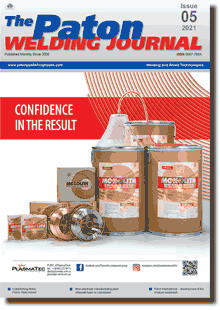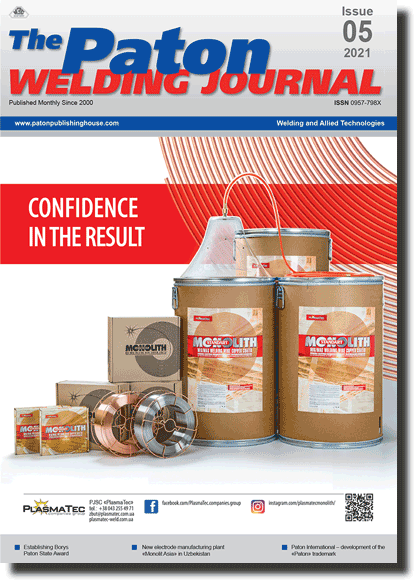| 2021 №05 (05) |
DOI of Article 10.37434/tpwj2021.05.06 |
2021 №05 (07) |

The Paton Welding Journal, 2021, #5, 35-40 pages
Effect of thermal cycles in electron beam welding of aluminium 1570 alloy on mechanical properties of welded joints
V.M. Nesterenkov, V.V. Skryabinskyi and M.O. Rusynyk
E.O. Paton Electric Welding Institute of the NASU. 11 Kazymyr Malevych Str., 03150, Kyiv, Ukraine. E-mail: office@paton.kiev.ua
Abstract
The effect of welding speed on strength of joints and size of the heat-affected-zone in electron beam welding of 1570 alloy was investigated. Thermal cycles in the tail part of the welding pool and spots in the metal surface in the near-weld zone were determined. According to the thermal cycles of the welding pool, the rate of hardening of the weld metal was calculated and its effect on mechanical properties of the joints before and after artificial aging was investigated. Decrease in the welding speed and, consequently, increase in the lifetime of the liquid phase leads to the growth of hardness of the weld metal after aging, which is probably associated with a more complete dissolution of primary scandium intermetallics and its transition to a supersaturated solid solution during cooling. Measuring the hardness of metal in the cross-section of the joints, according to the thermal cycles of the corresponding points, it was determined that the temperature of the beginning of the loss of strength of the metal in electron beam welding of 1570 alloy is in the range of 450‒560 °С. It was found that artificial aging provides full strength welded joints with stamped semi-finished products, and explosion treatment is ineffective. It is possible to increase the strength of joints to the level of strength of hardened plates by 20 % applying plastic deformation and a subsequent artificial aging. 7 Ref., 3 Tables, 8 Figures.
Keywords: electron beam welding, aluminium alloy, welded joints, thermal cycles, mechanical properties, artificial aging
Received 14.04.2021
References
1. Filatov, Yu.A. (2014) Alloys of Al–Mg–Sc system as a special group of wrought aluminium alloys. Tekhnologiya Lyogkikh Splavov, 2, 34–41 [in Russian].2. Drits, M.E., Pavlenko, S.G., Toropova, L.S. et al. (1981) About mechanism of scandium effect on improvement of strength and thermal stability of Al–Mg system alloys. DAN SSSR, 257(2), 353–356 [in Russian].
3. Zakharov, V.V., Fisenko, I.A. (2013) On saving scandium when alloying aluminium alloys with it. Tekhnologiya Lyogkikh Splavov, 4, 52–60 [in Russian].
4. Berezina, A.L., Segida, E.A., Monastyrskaya, T.A., Kotko, A.V. (2008) Influence of solidification rate on anomalous supersaturation of Al–Mg–Sc alloys. Metallofizika i Novejshie Tekhnologii, 30(6), 849–857 [in Russian].
5. Fedorchuk, V.E., Kushnaryova, O.S., Alekseenko, T.A., Falchenko, Yu.V. (2014) Peculiarities of alloying of weld metal of high-strength aluminium alloy welded joints with scandium. The Paton Welding J., 5, 28-32. https://doi.org/10.15407/tpwj2014.05.05
6. Skryabinskyi, V.V., Nesterenkov, V.M., Rusynyk, M.O., Strashko, V.R. (2020) Effect of mode of electron beam welding, heat treatment and plastic deformation on strength of joints of aluminium 1570 alloy. Ibid., 5, 9-14. https://doi.org/10.37434/tpwj2020.05.02
7. Tretyak, N.G., Saenko, M.I., Petushkov, V.G. (1980) Explosion strengthening of welded joints of 1201 alloy. Avtomatich. Svarka, 9, 67–68 [in Russian].
Suggested Citation
V.M. Nesterenkov, V.V. Skryabinskyi and M.O. Rusynyk (2021) Effect of thermal cycles in electron beam welding of aluminium 1570 alloy on mechanical properties of welded joints. The Paton Welding J., 05, 35-40.The cost of subscription/purchase order journals or individual articles
| Journal/Currency | Annual Set | 1 issue printed |
1 issue |
one article |
| TPWJ/USD | 384 $ | 32 $ | 26 $ | 13 $ |
| TPWJ/EUR | 348 € | 29 € | 24 € | 12 € |
| TPWJ/UAH | 7200 UAH | 600 UAH | 600 UAH | 280 UAH |
| AS/UAH | 1800 UAH | 300 UAH | 300 UAH | 150 UAH |
| AS/USD | 192 $ | 32 $ | 26 $ | 13 $ |
| AS/EUR | 180 € | 30 € | 25 € | 12 € |
| SEM/UAH | 1200 UAH | 300 UAH | 300 UAH | 150 UAH |
| SEM/USD | 128 $ | 32 $ | 26 $ | 13 $ |
| SEM/EUR | 120 € | 30 € | 25 € | 12 € |
| TDNK/UAH | 1200 UAH | 300 UAH | 300 UAH | 150 UAH |
| TDNK/USD | 128 $ | 32 $ | 26 $ | 13 $ |
| TDNK/EUR | 120 € | 30 € | 25 € | 15 € |
AS = «Automatic Welding» - 6 issues per year;
TPWJ = «PATON WELDING JOURNAL» - 12 issues per year;
SEM = «Electrometallurgy Today» - 4 issues per year;
TDNK = «Technical Diagnostics and Non-Destructive Testing» - 4 issues per year.


